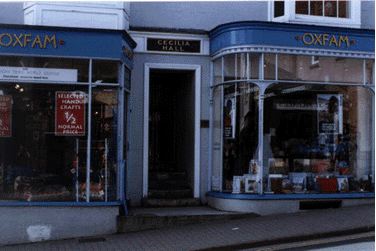
Following their marriage in 1889, Edward and Alice Elgar moved to London in the hope that this would improve Elgar's chances of musical advancement. However, after only two years this had proved to have been a miscalculation and with their financial position in a precarious state they returned to live in Great Malvern, first at 'Forli' in Alexandra Road, and then, in 1899, to 'Craeg Lea' at Malvern Wells (as well as renting a summer cottage, Birchwood Lodge, up in the Malvern Hills).
But Elgar's earliest association with Malvern was in 1886, and it was here that he first met the woman who was to become his wife.
As well as working with his father in the family music shop, Elgar, in his twenties, had a moderate success as a local musician and composer. He had had performed many pieces written for his church, St George's Roman Catholic Church in Worcester, as well as the gavottes and quadrilles that he had written for the attendant's band at the asylum at Powick. To supplement his income he was obliged to advertise: "Mr Edward Elgar, violinist (pupil of Herr A. Pollitzer, London), Begs to announce that he visits Malvern and neighbourhood to give Violin Lessons, advanced and elementary. Also Lessons in Accompaniment and Ensemble playing..."
To accommodate any private pupils he rented, for a half day per week, Cecilia Hall in Church Street, Great Malvern.

Yet it was through this door that Elgar's future wife was to pass in 1886.
Caroline Alice Roberts, of Hazeldine House, Redmarley, Gloucestershire was the daughter of the late Major-General Sir Henry Roberts. She was already an accomplished pianist (though opinions vary as to how accomplished!) but was anxious to take further lessons. Elgar, at this time was 29 years of age and Alice was almost nine years older. But romance blossomed and in 1888 they became engaged.
This was not the first time that Elgar had formed a romantic liason but on at least two, and possibly three, previous occasions the romance foundered because of a difference in religion (Elgar was a Catholic) or because of his 'lower-class' or 'trade' upbringing which antagonised the parents of his would-be fianceés. It seemed that history was going to repeat itself again when Alice's relations threw up their hands in horror at the news (she was struck from at least one will as a result) and many of Alice's so-called friends snubbed her in the street because of her engagement to a 'penniless musician'.
Yet Alice stuck to her guns and following their marriage she was undoubtedly able to smooth the path of Elgar and enable him, eventually, to become the country's leading composer. Indeed, so reliant was he on her that following her death in 1920 he was unable to compose any further major work.
Had Caroline Alice Roberts not passed through that modest front door into Cecilia Hall, Elgar might never have become the composer of the great works that we know today.
 Return to the Tour Index
Return to the Tour Index